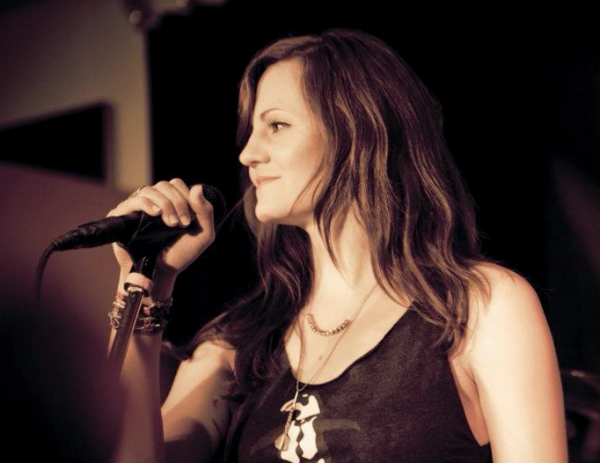Brett Anderson’s brisk rise to bona fide rock star status with the band The Donnas started when she and her bandmates were just teenagers living in Palo Alto. Years later she’s back where it all began, rocking the academic world as a Stanford undergrad set to graduate in June. And while her life in the classroom is a far cry from her days riding a tour bus and walking down red carpets, she sees one huge similarity between Stanford and the music industry.

Brett Anderson performs at one of The Donnas’ final shows. (Image credit: Casey Curry)
“They’re definitely both very competitive,” she said.
Anderson and her bandmates met when they were 13 years old and bonded over their shared love of hair metal and riot girl music. They formed a garage band called The Electrocutes and performed their first show at Jordan Middle School, with local gigs quickly following. The self-taught musicians adopted a style that Anderson, the band’s lead singer, described as “thrashy” and “screamy.” The group would later introduce musical influences from bands like The Ramones, Kiss, Mötley Crüe and Poison, and change their name to The Donnas.
Success came early and fast. At 16, the young rockers went on their first international tour in Japan, and shortly after graduating from Palo Alto High School they signed a deal with Lookout Records, a Berkeley-based independent label that also signed the band Green Day. The Donnas decided to attend college while they wrote their eponymous debut album. But their music career proved to be too big for school and they each left in their first year. Three more albums would follow – including American Teenage Rock ’n’ Roll Machine – before they signed to Atlantic Records in 2002.
“That was our major label,” Anderson said. “They had Led Zeppelin and AC/DC, which were the pinnacles of everything rock ’n’ roll, so it definitely felt like we had made it.”
Over the next few years, The Donnas released three more studio albums, embarked on tours and traveled the world, including Australia, where they played at the Big Day Out festival alongside the Beastie Boys and The Hives. Anderson recalls that the festival was a challenging time for her because it coincided with a breakup with a boyfriend. “I was on a rampage and I definitely cried a lot,” she said. But Anderson was able to channel the emotional turmoil to her music, which resulted in better performances. “Audiences love it when you’re falling apart!”
Music videos, awards and high-profile television appearances brought the band more mainstream success. But after the release of their last album with Atlantic Records in 2007, music streaming services grew in popularity and the band saw a decline in record sales. They turned to touring to make money, but then the 2008 recession arrived and their income from live shows took a hit.

Brett Anderson, center, and her bandmates performing live. (Image credit: Courtesy of Brett Anderson)
“It just got harder and harder to make it work,” Anderson said. As The Donnas’ momentum slowed, the band members began pursuing interests outside of music. “We all had stuff we missed out on because we were on tour, so we were kind of playing catch up in our regular lives,” she said.
The next few years would prove to be difficult for Anderson. Struggles with alcohol dependence, a bad relationship and burnout from a day job were compounded by a flood in her storage space that destroyed many of her belongings. At one point she even came home to find an eviction notice on her front door. “I had nothing. My life was ruined,” Anderson said, adding that she hit rock bottom more than once. “I kind of bounced on the bottom for a while,” she joked.
When a friend asked her to take a class with her at Los Angeles City College, Anderson reluctantly agreed. One class turned to two, and then three, and soon she was fully immersed in school. Although she enjoyed her classes, starting clubs and making new mentors and friends, she said the experience wasn’t easy. “It was really humiliating going back to school because part of me was like, ‘I was successful and now I’m sitting in this classroom and no one knows or cares,’” she said.
But school reignited her intellectual curiosities and put her on a new path. Her plan was to attend the University of California, Los Angeles, but she applied to Stanford, despite feeling that getting accepted was “a shot in the dark.” In 2016, after four years at LA City College, she was admitted to Stanford, an offer she knew she couldn’t refuse. “It’s the big dream,” she said.
Today she spends much of her time in the Life-span Development Laboratory, working under psychology Professor Laura Carstensen. “This lab focuses on the whole life span and particularly aging and longevity, which is my interest,” Anderson said. She’s currently working on her honors thesis on temporal discounting, or the tendency to devalue delayed rewards. Anderson, who is the second member of The Donnas to attend Stanford, recently applied to graduate school and is considering a career as a therapist.
Outside the classroom Anderson has embraced the Cardinal identity, attending football games and other events. She’s also involved with the Stanford Resilience Project, a program that encourages students to accept and learn from their defeats, something she knows a lot about. “When you’re at your lowest, there’s a flipside where you believe anything is possible,” she said. “So there’s this really great freedom in failure and I felt that myself.”
Anderson still writes music and occasionally performs with a band outside of Stanford. When asked if she sees music making a resurgence in her career, she said she was completely fulfilled with that aspect of her life, but wouldn’t rule it out. “I love music and recording,” she said. “So I don’t want to say no.”